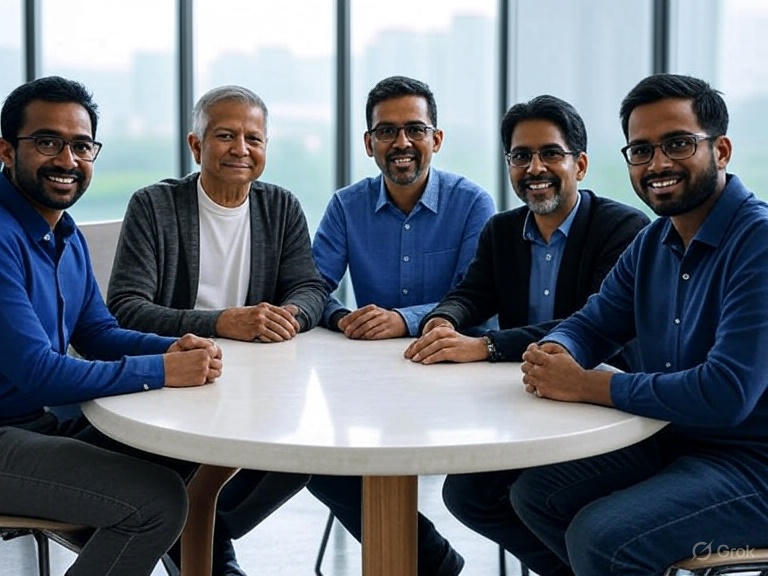5 Bangladeshi Innovators Who Are Changing the World
1. Muhammad Yunus: Revolutionizing Global Finance with Microcredit
Muhammad Yunus, often hailed as the “Banker to the Poor,” stands as one of the most influential Bangladeshi innovators of our time. Born in 1940 in Chittagong, Bangladesh, Yunus earned a PhD in economics from Vanderbilt University before returning to his homeland during the 1970s famine. Witnessing the despair of rural poverty, he founded the Grameen Bank in 1983, introducing the concept of microcredit—small, collateral-free loans to the impoverished, particularly women, to start micro-businesses.
This innovation transformed the fight against poverty. By 2023, Grameen Bank had disbursed over $34 billion in loans to more than 9 million borrowers, 97% of whom are women. Yunus’s model has inspired over 100 countries to adopt microfinance, earning him the Nobel Peace Prize in 2006. His work proves that financial inclusion can break cycles of poverty, fostering entrepreneurship in the world’s most vulnerable communities.
Yunus’s impact extends beyond banking. He has authored books like Banker to the Poor and advocated for social business, where profits reinvest in societal good. Today, at 84, he continues influencing global policy, reminding us that innovation isn’t just about profit—it’s about human dignity. Bangladeshi innovators like Yunus show how local solutions can scale globally, changing economic paradigms forever.
2. Jawed Karim: Co-Founding YouTube and Redefining Digital Media
Jawed Karim, a Bangladeshi-American innovator, co-founded YouTube, the video-sharing giant that has revolutionized how we consume and share content. Born in 1979 in Dhaka, Bangladesh, Karim moved to the U.S. as a child. He pursued computer science at the University of Illinois and later worked at PayPal, where he met co-founders Chad Hurley and Steve Chen.
In 2005, frustrated by the lack of easy video upload options online, the trio launched YouTube from a garage in San Mateo, California. Karim uploaded the platform’s first video, “Me at the zoo,” marking the birth of user-generated content on a massive scale. Acquired by Google for $1.65 billion in 2006, YouTube now boasts over 2.5 billion monthly users, democratizing information, entertainment, and education.
Karim’s Bangladeshi roots infuse his innovative spirit—rooted in resourcefulness amid challenges. After YouTube, he pursued a PhD at Stanford and invested in ventures like Airbnb. His creation has empowered creators worldwide, from aspiring musicians in rural Bangladesh to global activists. As a Bangladeshi innovator changing the world, Karim exemplifies how one simple idea can connect humanity, fostering creativity and free expression in the digital age.
3. Sal Khan: Empowering Education Through Khan Academy
Salman Khan, better known as Sal Khan, is the Bangladeshi-American founder of Khan Academy, a free online learning platform that’s educated billions. Born in 1976 in Metairie, Louisiana, to Bangladeshi immigrant parents, Khan grew up with a deep appreciation for education’s transformative power. A MIT graduate with degrees in mathematics, electrical engineering, and computer science, he initially tutored his cousin via Yahoo! Doodle in 2004.
What started as simple video lessons exploded into Khan Academy in 2008. Today, it offers over 10,000 lessons in subjects from math to history, translated into 50 languages and used in 190 countries. During the COVID-19 pandemic, it reached 100 million students monthly, bridging educational gaps in underserved areas like rural Bangladesh.
Khan’s innovation lies in personalized, bite-sized learning that’s accessible to all. His TED Talk has over 50 million views, and he’s authored The One World Schoolhouse. As a Bangladeshi innovator, Khan addresses inequality head-on, proving that quality education can be a global public good. His work inspires Bangladeshi youth to innovate in edtech, closing the digital divide one lesson at a time.
4. Fazlur Rahman Khan: Pioneering Modern Skyscraper Architecture
Fazlur Rahman Khan, dubbed the “Einstein of Structural Engineering,” transformed urban skylines with his tube structural system. Born in 1929 in Dhamrai, Bangladesh (then East Bengal), Khan studied at the University of Dhaka before earning advanced degrees from the University of Illinois. He joined Skidmore, Owings & Merrill in Chicago, where his innovations took flight.
In the 1960s, Khan developed the “tube” design—a bundled system of steel frames that allows buildings to soar higher with less material. This enabled icons like the Willis Tower (formerly Sears Tower) in Chicago and the John Hancock Center. His framed-tube system revolutionized architecture, making supertall buildings efficient and earthquake-resistant. By his death in 1982, Khan had influenced over 100 structures worldwide, including the Petronas Towers.
As a Bangladeshi innovator changing the world, Khan’s work addressed urban density challenges, enabling sustainable city growth. His legacy lives in modern megacities, proving that engineering from a small nation can redefine global infrastructure. Bangladesh honors him with the Fazlur Rahman Khan Award, inspiring young engineers to build the future.
5. Abul Hussam: Innovating Clean Water Solutions with the Sono Filter
Abul Hussam, a chemistry professor and social entrepreneur, invented the Sono arsenic filter, saving millions from waterborne diseases in arsenic-contaminated regions. Born in 1945 in Kushtia, Bangladesh, Hussam faced the arsenic crisis firsthand—Bangladesh’s groundwater is among the world’s most polluted. After earning a PhD from the University of Glasgow, he returned to George Mason University but dedicated his career to this issue.
In 1997, Hussam developed the Sono filter using affordable materials like iron filings, sand, and charcoal. It removes 99% of arsenic without electricity or chemicals, costing just $40 per unit. Deployed since 2006, it has provided safe water to over 30 million people in Bangladesh and beyond, earning the 2007 Stockholm Challenge Award and a $1 million Grainger Challenge Prize.
Hussam’s innovation combines science with compassion, addressing a crisis affecting 140 million globally. As a Bangladeshi innovator, he exemplifies grassroots solutions to environmental threats, influencing water purification worldwide. His work highlights how local problems can yield universal fixes, fostering hope in climate-vulnerable communities.
Conclusion: The Global Ripple of Bangladeshi Innovation
These five Bangladeshi innovators—Muhammad Yunus, Jawed Karim, Sal Khan, Fazlur Rahman Khan, and Abul Hussam—illustrate the boundless potential of ingenuity from Bangladesh. From alleviating poverty and educating masses to building taller cities and purifying water, their contributions ripple across continents. As Bangladesh eyes a $1 trillion economy by 2041, these trailblazers pave the way for more. Aspiring innovators everywhere can learn from them: true change starts with solving real problems with bold ideas. In a world craving solutions, Bangladeshi innovators are leading the charge, proving that small nations can spark global revolutions.






